NEHAWU DEATH STRIKE DAY THREE
Massive hospital disruptions across SA as health workers continue strike
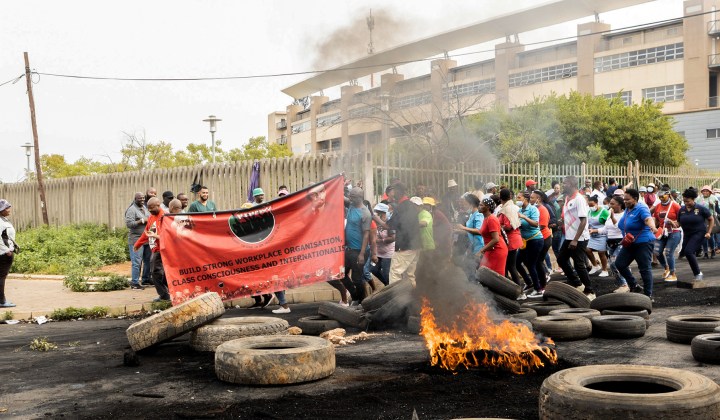
On Wednesday, Nehawu continued its strike for a third day, with patients across South Africa struggling to access hospitals, surgeries and dispensaries. Appointments are being cancelled and staff intimidated.
Maverick Citizen has been contacted by doctors, nurses, health workers and patients across the country about the Nehawu strike. Below, we attempt to document their experiences and concerns, which flooded in throughout the day.
Gauteng
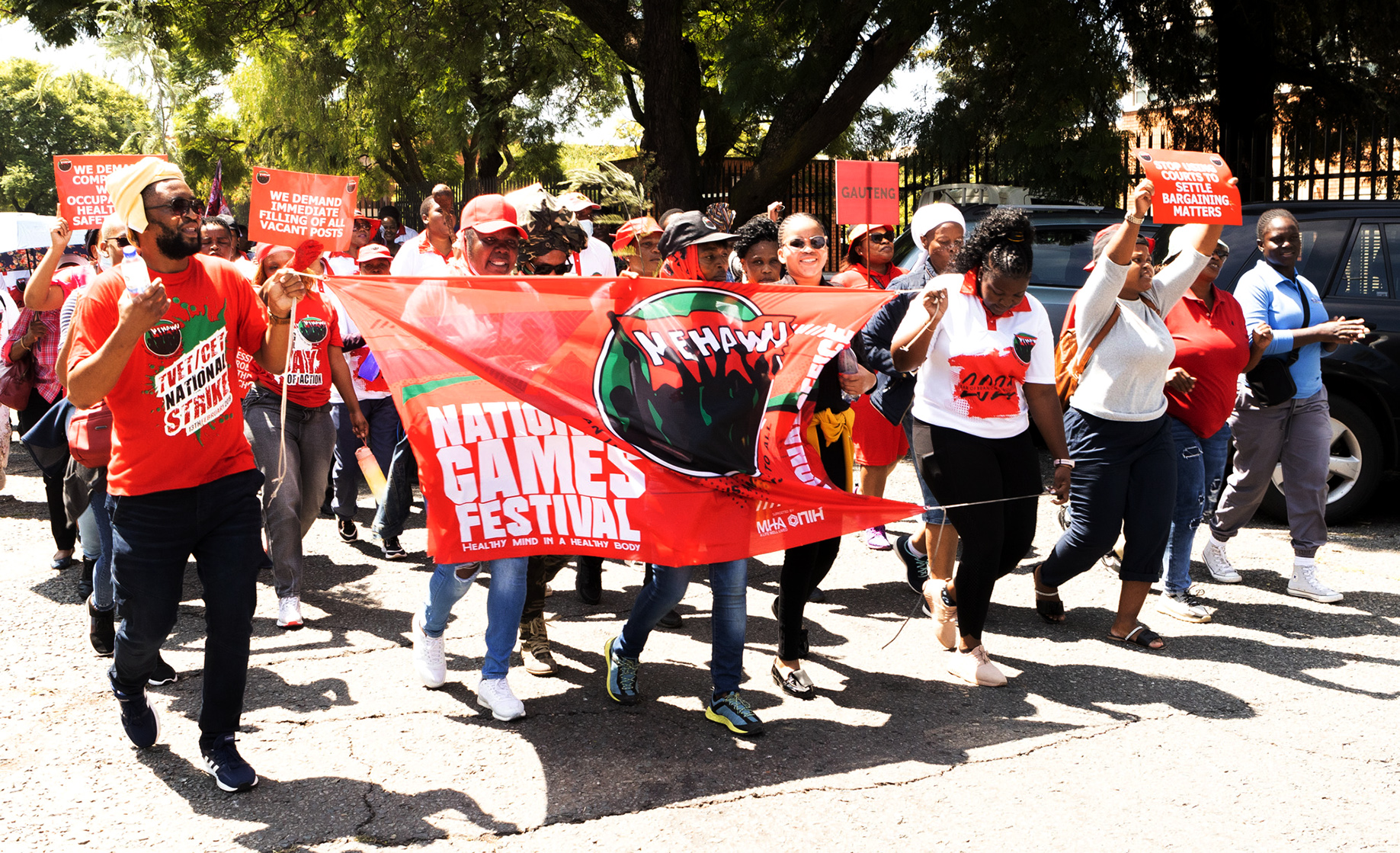
Nehawu members protest outside Charlotte Maxeke Hospital in Johannesburg on 8 March 2023. (Photo: Gallo Images / Fani Mahuntsi)
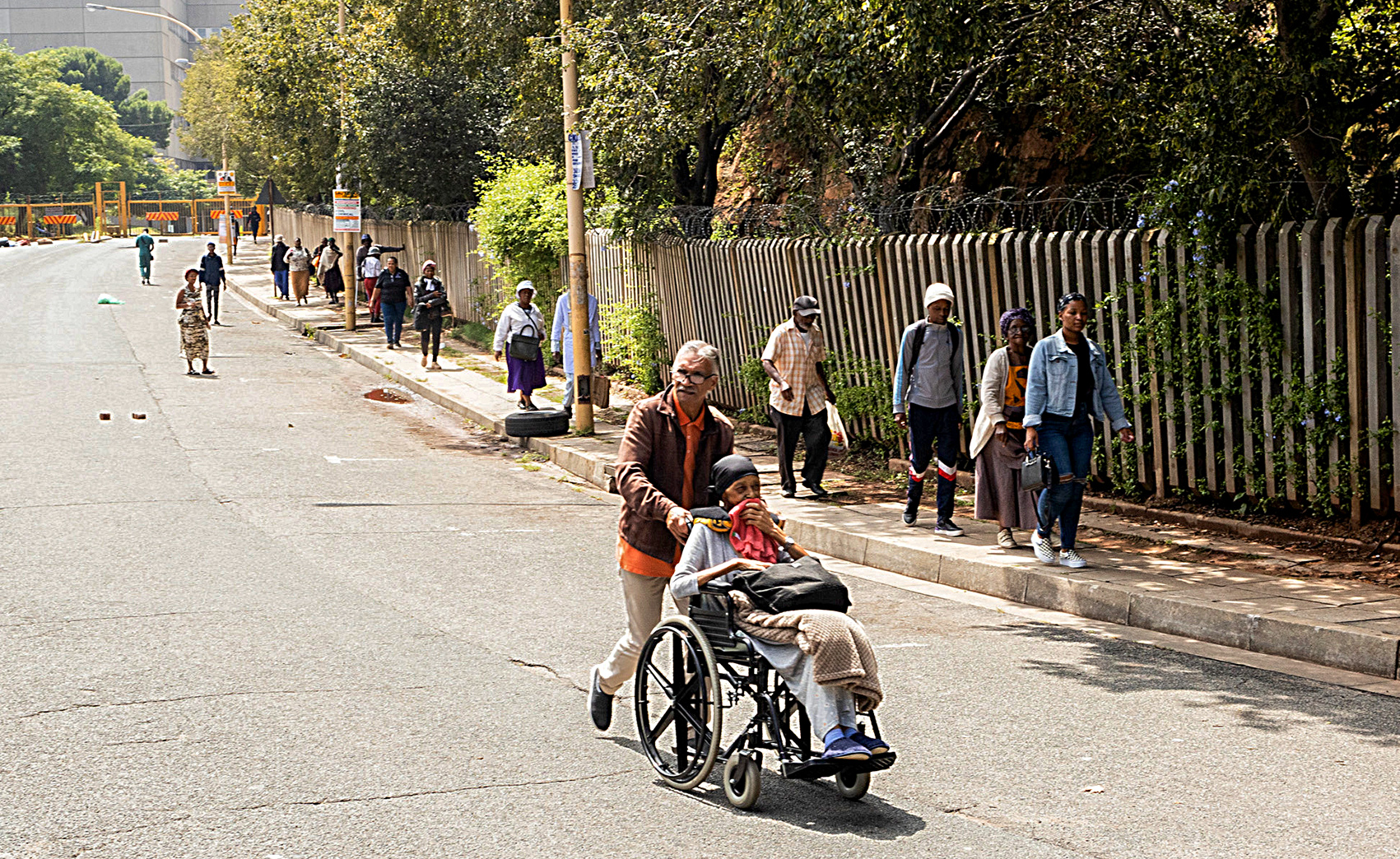
Patients had to walk a long way due to the road being closed at Charlotte Maxeke Hospital in Johannesburg on 8 March 2023. (Photo: Gallo Images / Fani Mahuntsi)
Several facilities were affected in Gauteng. Patients suffered as surgery and appointments were cancelled because of the shortage of staff. Services at the Charlotte Maxeke Hospital were disrupted when roads into the hospital were blocked with rocks.
There were similar scenes at Stratford Community Health Centre, where patients were barred from accessing services and locked outside the facility premises. There was no access to Pholosong Hospital in Ekurhuleni.
Visit Daily Maverick’s home page for more news, analysis and investigations
Tembisa Hospital was functional, but with limited nursing staff in the wards and a request to place all elective surgery on hold.
Intimidation of non-striking workers continued, with reports that some staff slept at Bheki Mlangeni Hospital in Soweto overnight because of the intimidation. Gauteng Department of Health spokesperson Motalatale Modiba confirmed that several facilities had been affected by the strike.
“Patients are not able to access the facilities and also some of the health workers are being prevented from accessing the facilities.”

Fires burnt at all entrances to the Bheki Mlangeni Hospital in Soweto, Johannesburg. Some staff slept at the hospital becuase of intimidation. (Photo: Supplied)
Modiba said while striking was a constitutional right, it should not be exercised in a way that infringed on the right to healthcare. Other facilities affected include Helen Joseph Hospital, Chris Hani Baragwanath, Thelle Mogoerane Regional Hospital, Tembisa Hospital, Kopanong Provincial Hospital, Sebokeng Hospital, Heidelberg Hospital, Leratong Hospital, Carletonville Hospital and Rahima Moosa Mother and Child Hospital.
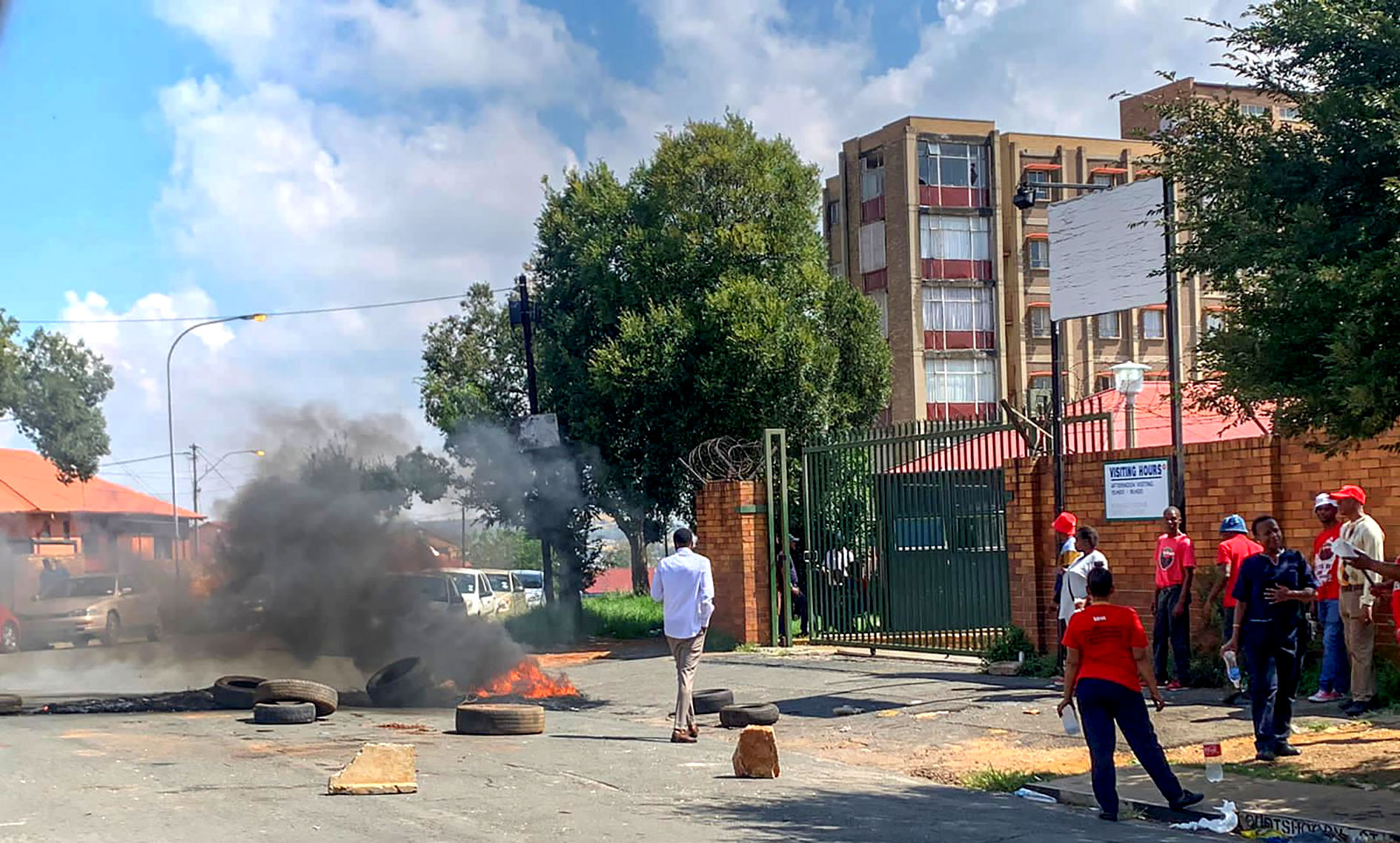
A blocked entrance to Rahima Moosa Mother and Child Hospital, Coronationville, Johannesburg. (Photo: Supplied)
The Chiawelo Community Healthcare Centre in Soweto functioned almost optimally on Wednesday morning. Many people had complaints, but they were based on previous challenges and not related to the strike.
Daily Maverick spoke to three nurses on Wednesday morning who had come to the Chiawelo clinic for training. “All is running well here… arrived this morning for training and we are fine, patients too,” one said.
One thing that caught the eye at the Chiawelo clinic was the filth.
“We don’t have clinics here in Soweto any more. The only hospital that was meant to deal with the Bara [Chris Hani Baragwanath Hospital] backlog is the Bheki Mlangeni Hospital, which is corrupt to the core,” a nurse said.
Daily Maverick went to Bara. In the morning, a group of Nehawu members protested at the gate, intimidating the security guards. Later they protested peacefully outside the gate. A police van at the entrance monitored the protesters.
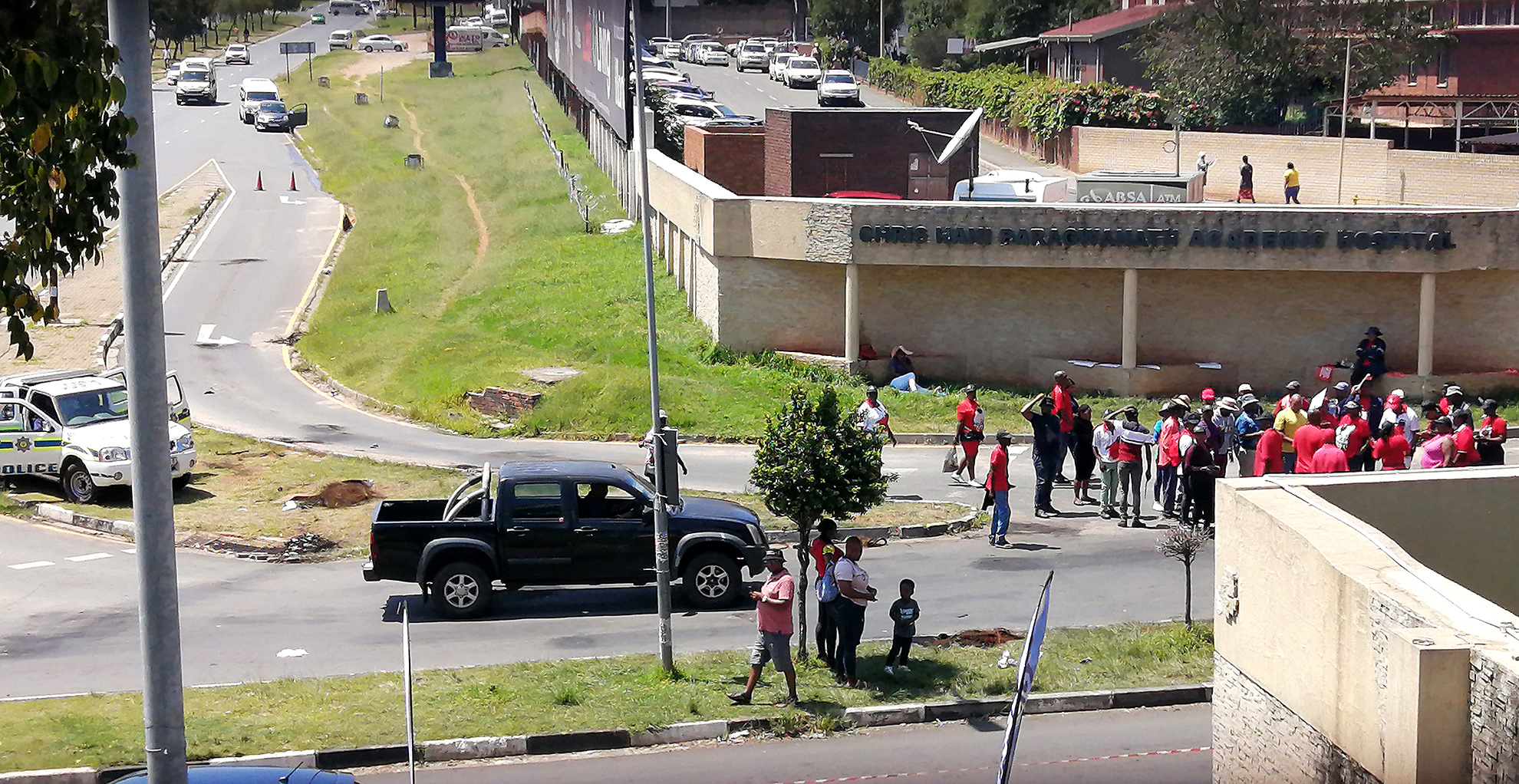
Nehawu members protest at the entrance to Chris Hani Baragwanath Hospital in Soweto on 8 March 2023. (Photo: Bheki Simelane)
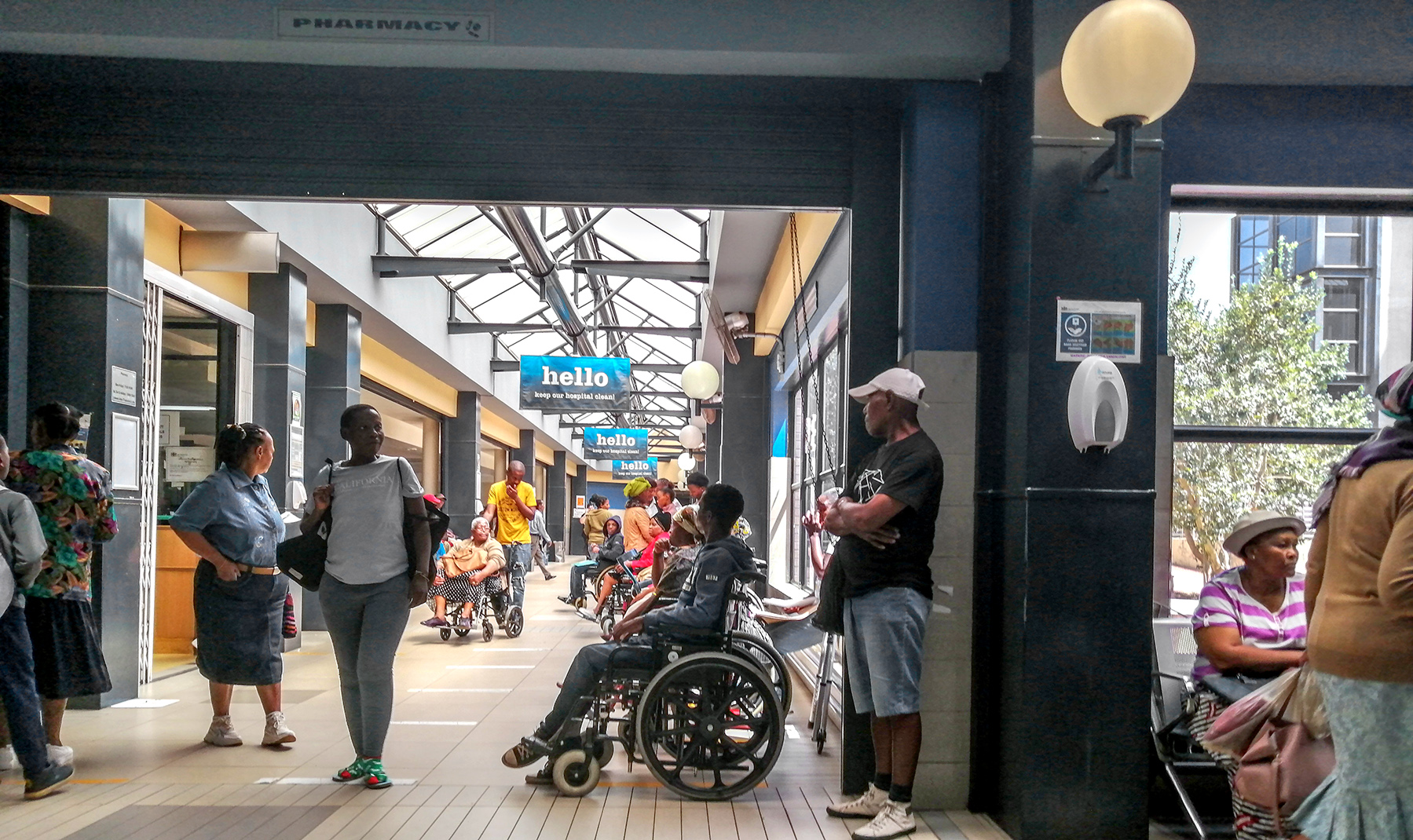
Wheelchair-bound patients wait for their medicine at the Chris Hani Baragwanath Hospital dispensary on 8 March 2023. (Photo: Bheki Simelane)
The dispensary at the Chris Baragwanath Hospital was having a hard time. A line of patients in wheelchairs spent the morning waiting for medication.
Hospital stretchers at the trauma ward stood idle. When a man who appeared to be a guard and was sleeping on a bloodied stretcher was approached by Daily Maverick, he simply sat up and begged for a cigarette.
The guards at the entrance who monitor visitors and visiting hours were on a go-slow and many people just walked in.
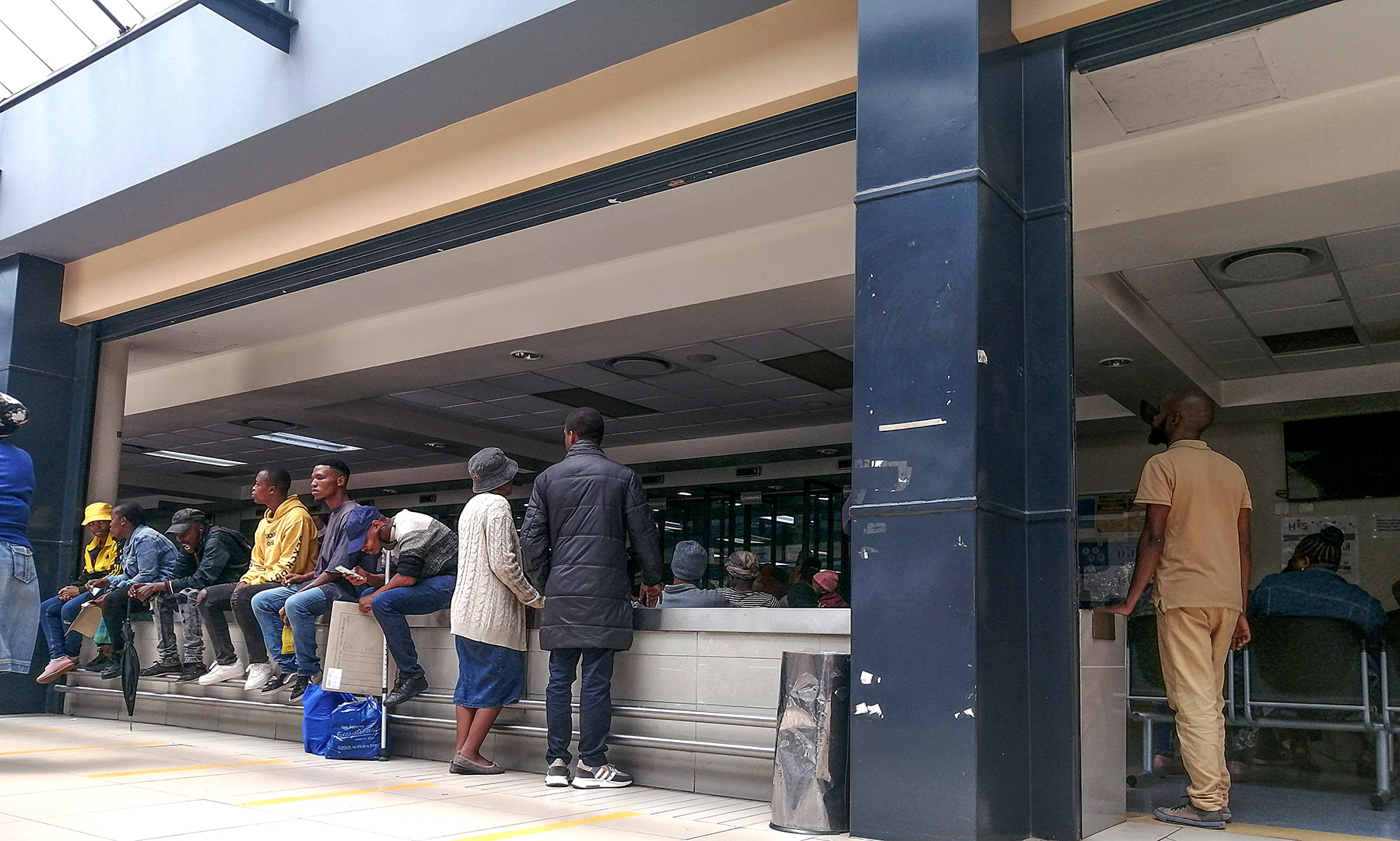
Patients wait in a long queue at a dispensary at the Chris Hani Baragwanath Hospital in Soweto on Wednesday, 8 March. (Photo: Bheki Simelane)

A Chris Hani Baragwanath Hospital patient, Khensani Mhlanga from Orange Farm, holds his numbered ticket while he waits with hundreds of patients at the hospital dispensary Wednesday, 8 March 2023. (Photo: Bheki Simelane)
“I came with my granny. If she finishes first, I am number 679 and might have to come back tomorrow. We pay R84 double; a single return for both of us is R42 to get here, and it’s from my grannie’s grant,” Khensani Mhlanga, who came to Bara from Orange Farm with her grandmother, told us.
KwaZulu-Natal
Nomagugu Simelane, the KwaZulu-Natal health MEC, said facilities in the province were forced to operate with a skeleton staff as workers continued to struggle to enter the facilities.
Workers affiliated with Nehawu were reportedly stopping doctors from entering Grey’s Hospital in Pietermaritzburg. The entrances to the hospital were blocked and tyres were burnt. It was reported that an ambulance carrying an injured child was attacked by striking healthcare workers.
A doctor told Maverick Citizen: “At Edendale Hospital yesterday there was a complete blockade of the facility, death threats to the CEO and a host of other illegal activities. The local SAPS were repeatedly asked for assistance throughout the day, starting from 5am. The requests were escalated to the commissioner via the DOH [Department of Health] district management. At no point during the day did any police arrive. Our head of labour relations in HR speculates that this is due to the support of Popcru for Nehawu.”
Mpumalanga
Services were interrupted at Witbank Hospital on Wednesday morning. At Embhuleni Hospital, the strikes were initially peaceful, but on Wednesday turned violent.
Nqobile Dladla, a medical doctor doing her community service at the hospital, told Maverick Citizen she had been assaulted while attempting to enter the hospital.
“I received a call from a senior doctor in maternity that there was an emergency C-section and we had to return to the hospital. When we arrived, the clinic manager tried to talk to those striking but they did not allow people to go in,” she said.
Dladla explained that they had been called for an emergency. “If we did not go inside and carry out this operation, the mother and baby would be put at risk and might even end up dying,” to which she says she was told by the strikers: “During a strike, people die.”
Eventually, she was allowed in but one of the protesters grabbed her and attempted to drag her outside the gates of the hospital.
“A colleague saw this and tried to scream for help. Security personnel by the gate did not do anything, they just watched and only intervened when he had pressed me against the tree,” she said. Dladla has reported the incident to senior management, opened a police case and has a protection order against the man as he works in the same hospital.
“Hospital management has been quiet about the incident. I am not feeling safe, I am frightened for my life. Emotionally I am distraught, I was in tears the whole day,” she said.
Western Cape
It was reported that duty nursing staff at the Michael Mapongwana Community Health Clinic in Khayelitsha were forced to join the striking Nehawu members.
Maret Lesch, the spokesperson for the Western Cape health department, said protest action by Nehawu had been ongoing at the Michael Mapongwana clinic and Khayelitsha District Hospital.
“Although the buildings are not damaged, the protest has resulted in the transferring of critical patients to other facilities such as Helderberg, Tygerberg, Mitchells Plain and Karl Bremer hospitals,” said Lesch.
“Last night, protesters disrupted services and blocked staff from entering Khayelitsha District Hospital until 11pm. We are closely monitoring pre- and post-shift changes.”
The protests have resulted in operational challenges such as procedure backlogs and staff shortages at the facility, as personnel have been prevented from entering the premises.
“Khayelitsha District Hospital is screening non-urgent referrals from surrounding clinics until staffing stabilises,” said Lesch, adding that plans were in place to ensure the continuation of health services.
Peaceful, isolated protests occurred at the Karl Bremer and Tygerberg hospitals, but did not disrupt services.
Lesch said the Western Cape health department condemned “any action that affects the safety of our patients and staff and [causes] the infringement of our clients’ human right to access healthcare services”.
Free State
The Bloemfontein High Court ordered that Nehawu and all striking employees be prohibited from doing anything that directly or indirectly obstructed or impeded access to and from health facilities across the Free State.
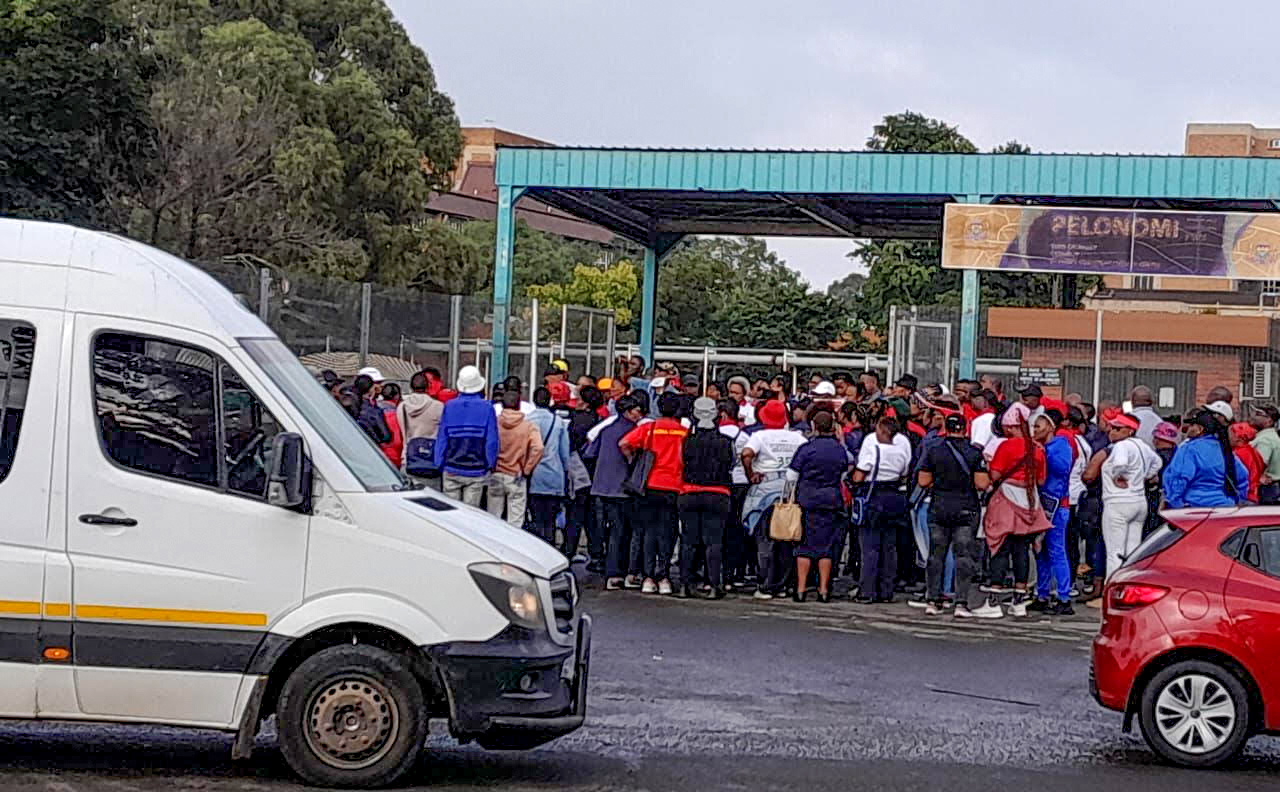
Pelonomi Hospital, Bloemfontein, Free State. (Photo: Supplied)
The court also prohibited the barricading of entrances or buildings, and the intimidation of staff members, employees and patients. However, a crowd approached the front door of Universitas Academic Hospital, where the physio department said there was intimidation. While the SAPS were set to be deployed from 5am at all affected hospitals, at 8.22, there were no police at Pelonomi Hospital in Bloemfontein. There were also no nurses in the wards at Pelonomi.
Nehawu members gathered outside the National District Hospital in Bloemfontein, promising there would not be any disturbance in service delivery at the hospital and patients and staff members were free to enter. Only one side of the main gate was barricaded.
Read more in Daily Maverick: “Strikers at Pelonomi Hospital in Bloemfontein armed with sjamboks as frazzled, terrified doctors warn that patients will die”
Limpopo
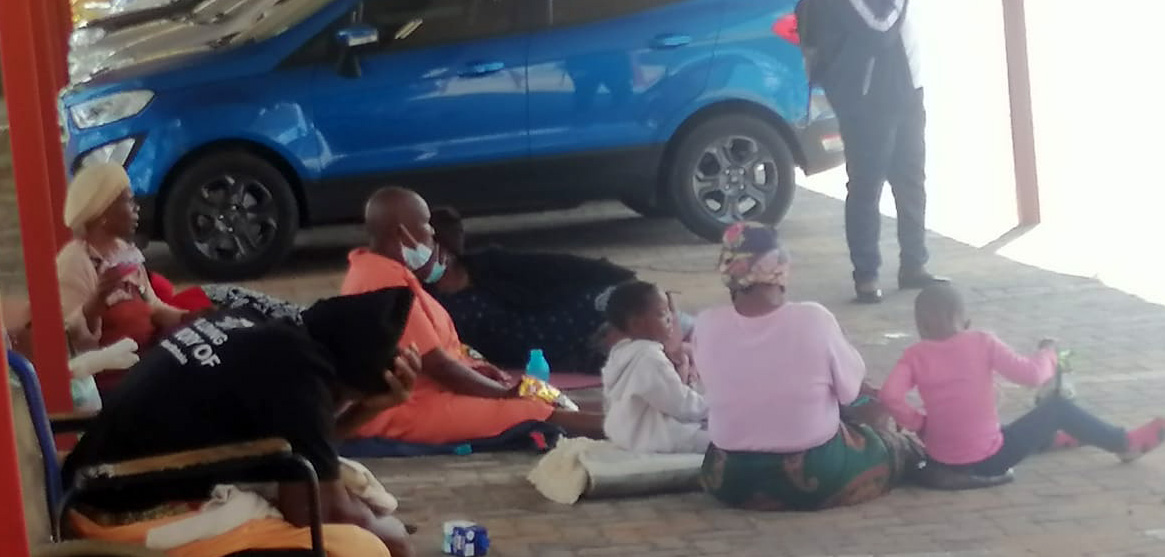
A group of patients in the parking area of Pietersburg Provincial Hospital in Polokwane. (Photo: Rudzani Tshivhase)
Nurses reportedly downed tools at Musina Hospital and blockaded the main gate. Only skeleton staff were on duty at Pietersburg Provincial Hospital and Polokwane Hospital. There were demonstrations in the morning, but those stopped once the police were called to the hospital.
Eastern Cape
There were reports of protests becoming violent in Mthatha: “Tyres punctured. They are hitting people with a whip at Level 2. They just hit one of the interns, and staff cannot enter the hospital,” said a healthcare worker. Zithulele Hospital was affected and there were reports of blood transport being stopped, with Eastern Cape hospitals running out of blood.
North West
There were protests at Moses Kotane Hospital, but no reports of service disturbances.
Read more in Daily Maverick: “‘It all started unexpectedly a few minutes before midnight’ — a doctor’s night of hell at Bloemfontein’s Pelonomi Hospital”
Northern Cape
Protesters reportedly tried to set Robert Sobukwe Hospital in Kimberley alight on Tuesday, but failed.
The Congress of South African Trade Unions
The Congress of South African Trade Unions (Cosatu) issued a statement calling for a peaceful and lawful public service strike.
“While we fully support the striking workers and believe that their fight is a legitimate one, we regret the disruption to public services which the strike has caused and any violent incidents or damage to property,” it said.
“We urge members and workers to remember that a strike is an act in defence of working-class interests, and it must not result in working-class communities who use these public facilities becoming the unintended casualties of it.
“The federation will never condone acts of violence by anyone, but we also do not accept that all unfortunate incidents can be blamed on striking workers. The police and management should avoid provocative actions that antagonise workers and poison the environment.
“We urge employers to sit down with unions at PSCBC [Public Service Coordinating Bargaining Council]. The employer should engage unions in good faith and realise that the consequences of a full-blown strike will be devastating for the economy and public services.”
Blood banks
The strike has affected the operations at blood banks across several provinces. These blood banks, run by the South African National Blood Service (SANBS), not only serve the hospitals in which they are located, but also other health facilities in the surrounding areas.
SANBS has 83 blood banks supporting close to 500 transfusion facilities. On Monday, 6 March — the first day of the Nehawu strike — blood banks that had to close included:
- Mapulaneng blood bank in Mpumalanga, where requests were rerouted to Nelspruit;
- Ermelo blood bank in Mpumalanga, where requests were rerouted to Teksa;
- Themba blood bank in Mpumalanga, where requests were rerouted to Nelspruit;
- Shongwe blood bank in Mpumalanga, where requests were rerouted to Nelspruit;
- Sebokeng blood bank in Johannesburg, where requests were rerouted to Vereeniging;
- Klerksdorp blood bank in North West, where private cases and cases from other hospitals were rerouted to Potchefstroom; and
- St. Elizabeth’s blood bank in Lusikisiki, Eastern Cape, where requests were rerouted to Mthatha.
The Mapulaneng and Shongwe blood banks remained closed on Tuesday, while another blood bank, Prince Msheyeni in KwaZulu-Natal, closed from 8am to 11am that day.
On Wednesday, the Vryburg blood bank in the Vaal was closed, with requests for blood being rerouted to Mafikeng. The Charlotte Maxeke Johannesburg Academic Hospital blood bank was also closed, with requests from outside hospitals rerouted to Milpark.
According to SANBS: “Hospitals with no onsite blood banks send their requests to their nearest blood bank. Provincial hospitals use their own transport [for the blood] and private hospitals use couriers that are contracted by SANBS.”
SANBS had not received any reports of patients at hospitals not receiving blood. However, the organisation said, “Blood stocks remain low as the demand for blood has been consistently higher since the beginning of the year. Blood groups O and B are especially affected.
“Under normal circumstances, the country requires five days’ cover of blood — about 3,500 units of blood each day — in order to serve the needs of hospitals and clinical requirements. Currently, the country only has enough blood supply for less than three days.” DM/MC
Those wishing to donate blood can find their nearest donation centre through the SANBS website, www.sanbs.org.za, or call 080 011 9031. To be eligible to donate blood, a person has to be between 16 and 75 years old and weigh more than 50kg.




















 Become an Insider
Become an Insider
To use the lives of sick people as a bargaining chips is beyond disgusting. Shame on Nehawu and the medical staff casually and cheerfully neglecting the helpless patients. At the same time the medical staff must be entitled to fair wages. Surely the time has come to set up a nation-wide trasparent system for ensuring that the workers in all essential and emergency services (and those services only) get a fair deal. Trustworthy arbitrators acceptable and binding to both sides can be found and used to resolve the remuneration issues fairly and without human life sacrifice. Needless to say, the emotions fueling the strike will be taken out of the equation.
When people die because of your actions, it is murder.